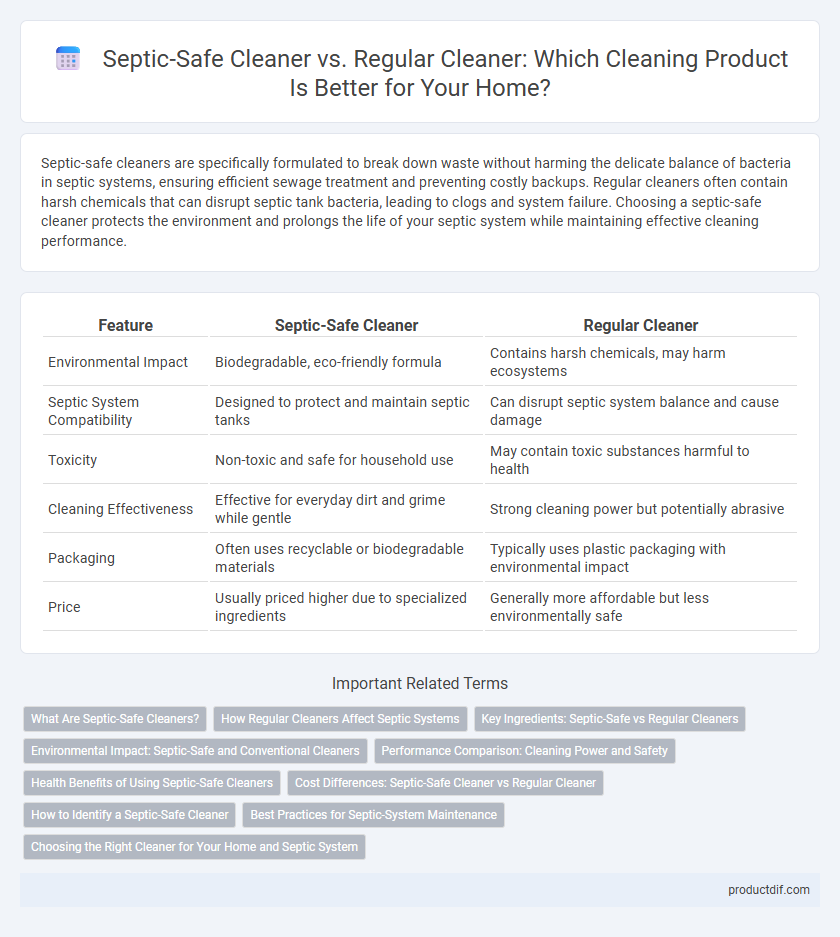Septic-safe cleaners are specifically formulated to break down waste without harming the delicate balance of bacteria in septic systems, ensuring efficient sewage treatment and preventing costly backups. Regular cleaners often contain harsh chemicals that can disrupt septic tank bacteria, leading to clogs and system failure. Choosing a septic-safe cleaner protects the environment and prolongs the life of your septic system while maintaining effective cleaning performance.
Table of Comparison
| Feature | Septic-Safe Cleaner | Regular Cleaner |
|---|---|---|
| Environmental Impact | Biodegradable, eco-friendly formula | Contains harsh chemicals, may harm ecosystems |
| Septic System Compatibility | Designed to protect and maintain septic tanks | Can disrupt septic system balance and cause damage |
| Toxicity | Non-toxic and safe for household use | May contain toxic substances harmful to health |
| Cleaning Effectiveness | Effective for everyday dirt and grime while gentle | Strong cleaning power but potentially abrasive |
| Packaging | Often uses recyclable or biodegradable materials | Typically uses plastic packaging with environmental impact |
| Price | Usually priced higher due to specialized ingredients | Generally more affordable but less environmentally safe |
What Are Septic-Safe Cleaners?
Septic-safe cleaners are specifically formulated to break down waste without harming the natural bacteria essential for septic system function. Unlike regular cleaners that may contain harsh chemicals, septic-safe products use biodegradable ingredients that prevent clogging and preserve septic tank health. Using septic-safe cleaners extends the lifespan of septic systems by maintaining their biological activity and preventing costly repairs.
How Regular Cleaners Affect Septic Systems
Regular cleaners often contain harsh chemicals like phosphates, bleach, and ammonia that disrupt the natural bacterial balance essential for septic system function. These substances can kill vital microorganisms responsible for breaking down waste, leading to clogged pipes and costly system failures. Using septic-safe cleaners minimizes damage by maintaining microbial health, preventing buildups, and extending the lifespan of the septic system.
Key Ingredients: Septic-Safe vs Regular Cleaners
Septic-safe cleaners contain biodegradable surfactants and enzymes that break down organic waste without disrupting the natural bacteria in septic systems. Regular cleaners often include harsh chemicals like bleach, ammonia, and phosphates that can kill beneficial bacteria and cause septic system damage. Choosing septic-safe products ensures effective cleaning while preserving septic tank health and preventing costly repairs.
Environmental Impact: Septic-Safe and Conventional Cleaners
Septic-safe cleaners contain biodegradable ingredients designed to break down naturally and maintain the balance of bacteria in septic systems, preventing harmful buildup and groundwater contamination. Conventional cleaners often contain harsh chemicals like phosphates and chlorine that can disrupt septic tank function and contribute to environmental pollution through runoff. Choosing septic-safe products reduces toxic waste discharge, promoting healthier soil and water ecosystems by minimizing chemical residues.
Performance Comparison: Cleaning Power and Safety
Septic-safe cleaners utilize biodegradable ingredients that effectively break down waste without harming septic systems, ensuring long-term functionality and minimal environmental impact. Regular cleaners often contain harsh chemicals like ammonia and bleach that provide strong surface cleaning but can disrupt septic bacteria, leading to system damage and costly repairs. Choosing septic-safe cleaners balances powerful cleaning performance with the preservation of septic health and environmental safety.
Health Benefits of Using Septic-Safe Cleaners
Septic-safe cleaners protect the delicate balance of beneficial bacteria essential for breaking down waste in septic systems, promoting long-term system health and reducing costly repairs. These cleaners typically contain biodegradable, non-toxic ingredients, minimizing harmful chemical exposure for both users and the environment. Using septic-safe products decreases the risk of contamination and supports household hygiene without compromising water quality or soil safety.
Cost Differences: Septic-Safe Cleaner vs Regular Cleaner
Septic-safe cleaners typically cost more upfront than regular cleaners due to specialized biodegradable formulas that protect septic systems. Regular cleaners may be cheaper initially but can cause costly plumbing issues by damaging septic tanks and reducing system efficiency. Long-term, septic-safe products offer better value by minimizing maintenance expenses and extending the lifespan of septic infrastructure.
How to Identify a Septic-Safe Cleaner
To identify a septic-safe cleaner, check for labels indicating it is biodegradable, phosphorus-free, and compatible with septic systems, ensuring it won't disrupt bacterial activity essential for waste breakdown. Ingredients such as natural enzymes or plant-based surfactants typically indicate a septic-safe formula, while harsh chemicals like bleach and ammonia are avoided. Certifications from environmental organizations or direct statements about septic compatibility provide additional assurance for safe use.
Best Practices for Septic-System Maintenance
Septic-safe cleaners use biodegradable ingredients that break down easily, preventing harmful chemicals from disrupting the natural bacteria essential for septic system function. Regular cleaners often contain harsh chemicals like bleach and ammonia, which can kill beneficial microbes and cause costly system damage. Using septic-safe products, limiting water usage, and scheduling routine inspections are best practices to maintain optimal septic system performance.
Choosing the Right Cleaner for Your Home and Septic System
Septic-safe cleaners contain biodegradable ingredients that break down naturally, preventing damage to the beneficial bacteria essential for septic system function, while regular cleaners often contain harsh chemicals that can disrupt this balance and cause system failures. Choosing the right cleaner involves selecting products labeled specifically as septic-safe to protect plumbing and maintain optimal waste decomposition. Regular use of septic-safe cleaners extends the lifespan of your septic system and minimizes costly repairs.
Septic-safe cleaner vs Regular cleaner Infographic

 productdif.com
productdif.com